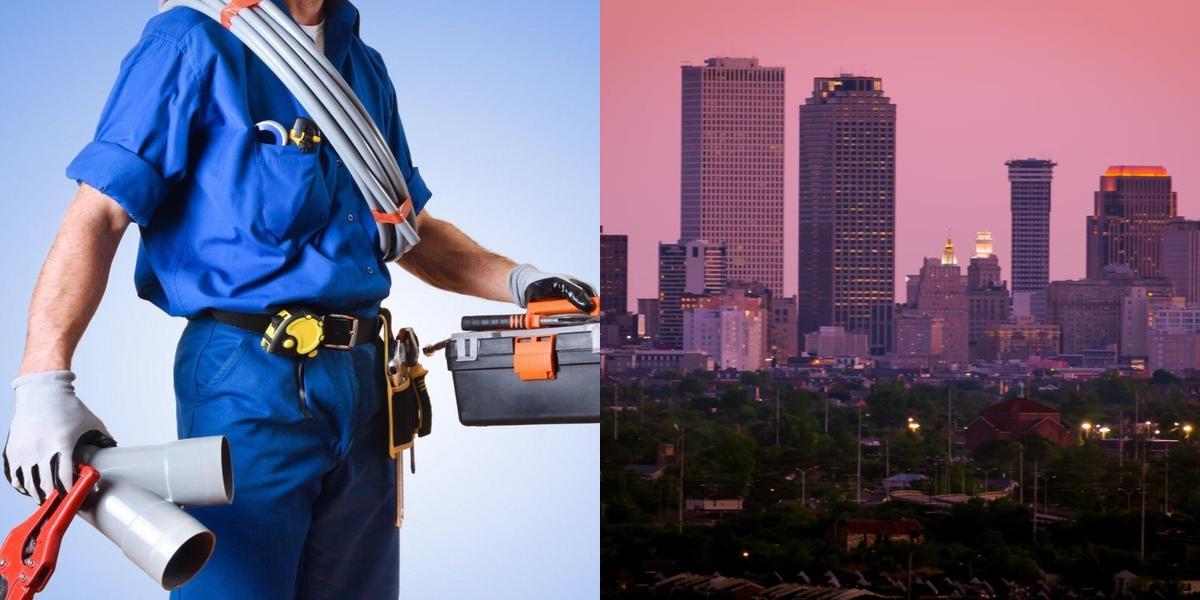How to Become a Plumber in Louisiana

Want personalized recommendations?
Let's match you to the right program

Are you interested in a hands-on career that offers stability and a decent income? If so, becoming a plumber might be the perfect fit for you. Plumbers are skilled professionals who install, repair, and maintain plumbing systems. In this blog post, we will explore how to become a plumber in Louisiana.
Article continues after recommendations
Recommended for you
What is a Plumber?
Plumbers are responsible for ensuring the proper functioning of water supply, drainage, and sewage systems in residential, commercial, and industrial buildings. Their duties include:
- Reading blueprints and technical drawings to plan plumbing installations
- Installing pipes and fixtures, such as sinks, toilets, and water heaters
- Repairing and maintaining plumbing systems
- Detecting and fixing leaks and other plumbing issues
- Collaborating with other professionals, such as electricians and construction workers, to complete projects
Where Does a Plumber Work?
Plumbers can work in various settings, including:
- Residential homes: Many plumbers specialize in residential plumbing, working on new construction projects or providing repair and maintenance services for homeowners.
- Commercial buildings: Plumbers may be employed by companies that specialize in commercial plumbing, serving businesses, office buildings, and retail establishments.
- Industrial facilities: Some plumbers work in industrial settings, such as factories, power plants, and manufacturing facilities.
How to Become a Plumber in Louisiana?
To become a plumber in Louisiana, one must first complete a state-approved plumbing education program. Next, they must obtain a state-issued plumbing certification by passing the required exams. Once certified, they can then search for plumbing job opportunities to start earning a competitive salary in the field.
Requirements to Become a Plumber in Louisiana
To become a licensed plumber in Louisiana, you need to meet certain education and legal requirements. These include:
- High school diploma or GED: A basic educational requirement for entering plumber training programs.
- Vocational training: Completing a plumbing apprenticeship program or a vocational training course is essential. These programs provide hands-on experience and classroom instruction on plumbing techniques, codes, and safety procedures.
- State licensing: After completing your training, you will need to pass the Louisiana State Plumbing Exam to obtain a Journeyman or Master Plumber license. These licenses allow you to work independently and supervise apprentices.
Where Can I Find Plumber Classes in Louisiana?
If you're interested in becoming a plumber in Louisiana, Dreambound is the largest platform to find and compare vocational training programs. Dreambound offers a wide range of plumber classes in Louisiana, allowing you to choose the one that best fits your needs and schedule.
By visiting the Dreambound website at dreambound.com, you can easily search for plumber training programs near you. Dreambound provides detailed information about each program, including course content, duration, and cost. This makes it easier for you to make an informed decision and start your journey towards a rewarding career as a plumber.
Remember, becoming a plumber requires dedication, hard work, and a commitment to continuous learning. With the right training and qualifications, you can build a successful career in a field that is in high demand. So why wait? Start exploring your options and take the first step towards becoming a plumber in Louisiana today!
Exploring a Career in Plumber Outside Louisiana
If you've been reading this article and aspire to become a Plumber, but you reside in a different state, rest assured that achieving your goal is still within reach. You might consider exploring opportunities to become a Plumber in Florida, Massachusetts, Ohio, Virginia, or Wyoming. Don't worry if you haven't found your location among these, because Dreambound makes it easier than ever to pursue your dreams regardless of your location by simplifying the process of finding and comparing Plumber classes through a convenient search by zip code. With dedication and access to the right resources, you can confidently pursue a successful career in trade, construction, and industry, no matter where you live.
Get courses selected just for you
Try our powerful search engine
Article continues after recommendations
More recommendations for you
How do I get my Plumber certification?
If you're interested in becoming a plumber, one of the first steps you'll need to take is getting your plumber certification. This certification is necessary in order to legally work as a plumber in most states, including Louisiana. Here are the general steps you'll need to follow to get your plumber certification:
-
Education: The first step in becoming a certified plumber is to complete your education. Many technical schools and community colleges offer programs specifically for aspiring plumbers. These programs typically include a combination of classroom instruction and hands-on training. In Louisiana, for example, you can enroll in a plumbing apprenticeship program through a trade school or union.
-
Apprenticeship: After completing your education, you'll need to gain practical experience through an apprenticeship. This is an important step in becoming a skilled plumber, as it allows you to learn from experienced professionals in a real-world setting. During your apprenticeship, you'll work under the supervision of a licensed plumber and perform a variety of tasks, such as installing and repairing plumbing systems.
-
Licensing: Once you've completed your education and apprenticeship, you'll need to obtain your plumber's license. The requirements for obtaining a license can vary by state, so it's important to check with your local licensing board to determine the specific requirements for your area. In Louisiana, for example, you'll need to pass a written exam and a practical exam in order to become licensed as a plumber.
-
Continuing Education: After obtaining your plumber's license, it's important to stay up-to-date with the latest industry trends and regulations. Many states, including Louisiana, require licensed plumbers to complete continuing education courses on a regular basis in order to maintain their license. These courses can help you stay current on new plumbing techniques and technologies, as well as any changes to local building codes.
How do I get a job as a Plumber?
Once you've obtained your plumber certification, the next step is to find a job as a plumber. Here are some tips to help you get started:
-
Build your network: Networking is an important part of finding a job in any industry, and plumbing is no exception. Start by reaching out to your instructors, classmates, and anyone else you met during your education and apprenticeship. They may be able to connect you with job leads or recommend you for positions they hear about. You can also consider joining professional organizations, such as the Plumbing-Heating-Cooling Contractors Association (PHCC), to expand your network and access job listings.
-
Apply for apprenticeship programs: Many plumbing companies offer apprenticeship programs to help new plumbers gain practical experience. These programs typically involve a combination of on-the-job training and classroom instruction. Applying for an apprenticeship can be a great way to get your foot in the door and start building your skills and experience.
-
Create a strong resume: When applying for plumbing jobs, it's important to have a well-written resume that highlights your education, apprenticeship experience, and any relevant skills or certifications. Be sure to tailor your resume to each job you apply for, emphasizing the skills and experience that make you a strong candidate for that particular position.
-
Prepare for interviews: Before going on job interviews, take some time to prepare. Research the company you're interviewing with, familiarize yourself with their services and projects, and come up with some thoughtful questions to ask during the interview. Practice answering common interview questions, and be prepared to discuss your experience, skills, and why you're interested in working for that particular company.
-
Consider starting your own business: If you have an entrepreneurial spirit, you may want to consider starting your own plumbing business. This can be a rewarding career path that allows you to be your own boss and take on a variety of projects. However, starting a business requires careful planning and preparation, so be sure to do your research and create a solid business plan before taking the leap.
Career Paths and Opportunities after Becoming a Plumber
Once you've become a certified plumber and gained some experience in the field, there are several career paths and opportunities available to you. Here are a few options to consider:
-
Residential Plumbing: Many plumbers start their careers working in residential plumbing. This involves installing and repairing plumbing systems in homes and apartment buildings. Residential plumbers may work for plumbing companies or start their own businesses.
-
Commercial Plumbing: Commercial plumbers work on larger-scale projects, such as office buildings, schools, hospitals, and shopping centers. This type of work often involves more complex systems and may require additional certifications or specialized training.
-
Industrial Plumbing: Industrial plumbers work in settings such as factories, power plants, and manufacturing facilities. This type of work often involves working with large-scale plumbing systems, such as steam and gas lines.
-
Government or Municipal Plumbing: Some plumbers find employment with government agencies or municipalities. These plumbers may work on public infrastructure projects, such as water and sewage systems, or provide maintenance and repair services for government-owned buildings.
-
Specialization: As you gain experience in the plumbing industry, you may choose to specialize in a specific area. For example, you could become a pipefitter, gas fitter, or fire sprinkler installer. Specializing can help you stand out in the industry and potentially earn higher wages.
-
Teaching or Training: If you enjoy sharing your knowledge and experience with others, you may consider a career in teaching or training. Many technical schools and community colleges hire experienced plumbers to teach plumbing courses. You could also become a trainer for apprenticeship programs or start your own plumbing training business.
-
Business Ownership: After gaining experience and expertise in the plumbing industry, you may decide to start your own plumbing business. This can be a challenging but rewarding path that allows you to be your own boss and take on a variety of projects. Starting a business requires careful planning and preparation, so be sure to do your research and create a solid business plan.
Final Thoughts
Becoming a certified plumber can open up a world of opportunities for a rewarding and financially stable career. By completing the necessary education, gaining practical experience through an apprenticeship, and obtaining your plumber's license, you'll be well-prepared to start your career as a plumber. Whether you choose to work for a plumbing company, start your own business, or pursue a specialized area within the industry, the skills and knowledge you gain as a plumber will always be in demand. So why wait? Start your journey towards becoming a certified plumber today!
If you're considering a career shift or curious about different professional paths, Dreambound has written many guides to help you in making informed decisions. Here are a few:





